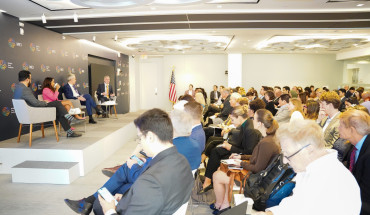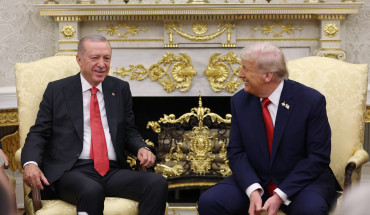*This article originally appeared in Foreign Policy online on June 15, 2011
The surprise of Turkey's parliamentary elections on Sunday was not that the ruling Justice and Development Party (AKP) effectively won its third term of single-party rule by sweeping 49.89 percent of the national vote. The most unexpected, under-reported and encouraging aspect of this election was the 5.9 percent of national votes won by the pro-Kurdish Peace and Democracy Party (BDP). These votes, augmented by the independent candidates supported by the BDP, secure the party an unprecedented 36 seats in parliament. This ensures the Kurds a say in the drafting of a civilian constitution which holds the potential of changing the very conception of Turkey's national identity.
Drafting a civilian constitution to replace one rooted in the 1980 military coup is the most urgent task of the new parliament. Most Western commentary has focused on the risk that Prime Minister Erdogan might use the constitutional revisions to undermine secularism. But in fact a new constitution could consolidate Turkish democracy and also finally afford basic rights to the Kurds, the country's largest and most politically active minority group. The current Turkish constitution is based on a Kemalist notion of Turkish national identity, which is homogeneous and leaves no room for ethnic and religious difference. Kurds, who have been essentially considered second-class citizens since the founding of the Turkish Republic, reject the Kemalist ethno-centric definition of Turkish citizenship and demand a more inclusive understanding that recognizes Kurdish identity.
Prime Minister Recep Tayyip Erdogan, in his first speech after the elections, promised that the new civilian constitution will embrace all of Turkey's ethnic and religious groups. The new parliamentary makeup provides the opportunity to make it so. In Sunday's elections, the AKP fell just short of a parliamentary majority necessary to unilaterally amend the constitution without support from other parties. This means that the AKP will have to cooperate with the other parties on drafting and ratifying a new constitution. The ultra-nationalist Nationalist Movement Party (MHP), Kemalist Republican People's Party (CHP), and pro-Kurdish BDP will have to come together to define a new understanding of citizenship that challenges the rigid Kemalist notion and adopt a liberal stance that acknowledges Turkey's ethnic, linguistic, religious, and cultural diversity. It is not clear whether a liberal consensus among these ideologically disparate parties will be possible. Since the MHP and the BDP are on opposite ends of the political spectrum on the issue of national identity, the AKP and the CHP will have to lead the process of building consensus.
Both the AKP and the CHP addressed the Kurdish question in their election manifestos, but define the issue as a matter of individual, rather than collective rights. This distinction is particularly observable in the context of the Kurdish language, a flashpoint in the debate on Kurdish rights and a key theme of the Kurd's political agenda. The AKP and CHP support Kurdish demands to speak their language but oppose Kurdish being the second official language of Turkey. For Kurds, demanding the right to speak Kurdish is an important first step toward the articulation of Kurdish identity but not sufficient to guarantee the survival of the Kurdish culture on the whole. Kurdish demands for education or public services in Kurdish are part of their claim for the survival of Kurdish cultural practices and denying the collective dimension of the Kurdish question will intensify the political and ethnic isolation of the Kurds.
The BDP will play an important role in communicating Kurdish demands and shaping the new parliament's approach to the problem. With 36 parliamentarians headed to Ankara, the Kurds have a clear mandate to work toward a solution within a democratic framework. But they will not settle for a few cosmetic changes that disregard the collective nature of the issue; they want more than to be able to speak Kurdish which is already a de facto component of public life in the Kurdish majority parts of the country. People speak Kurdish in their daily interactions, in courtrooms and in public institutions. They want these practices to become their constitutional rights and ensure the survival of their culture.
Turkish democracy is at a critical juncture and the AKP has a golden opportunity to undo decades of assimilationist policies, military coups, party closures and build the basis of a multicultural democracy. For that to happen, the AKP and the CHP have to drop their nationalist rhetoric they used throughout their election campaigns and offer a liberal alternative to the ultra nationalist MHP and the BDP. Turkey can only lead with a stronger democracy in a region where the call for freedom, equality and democracy is stronger than ever.
Assertions and opinions in this Policy Insight are solely those of the above-mentioned author(s) and do not necessarily reflect the views of the Middle East Institute, which expressly does not take positions on Middle East policy.
The Middle East Institute (MEI) is an independent, non-partisan, non-for-profit, educational organization. It does not engage in advocacy and its scholars’ opinions are their own. MEI welcomes financial donations, but retains sole editorial control over its work and its publications reflect only the authors’ views. For a listing of MEI donors, please click here.













